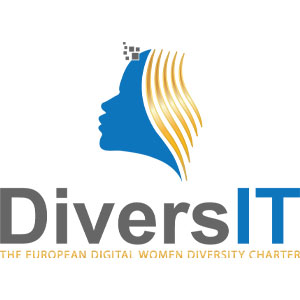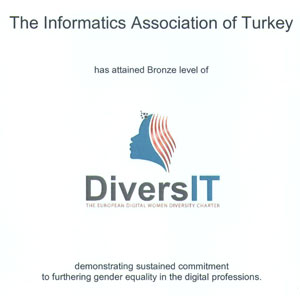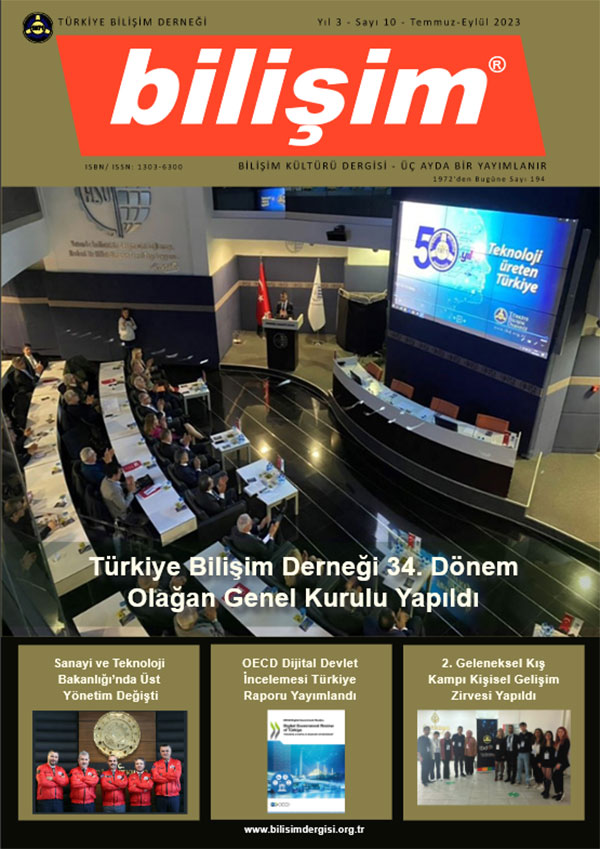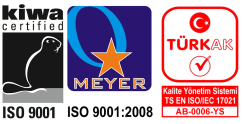4th Istanbul SMEs and Informatics Congress Webinar: Green World, Technology and Exporting SMEs
Our Main Media Sponsor KobiEfor's news https://www.kobi-efor.com.tr/edergi/sayilar/2021/11/#p=24
The 4th Istanbul SMEs and Informatics Congress (KOBİ21) Webinar, organized by the Istanbul Branch of the Turkish Informatics Association (TBD), with KobiEfor as the main media sponsor, was held online with the main theme of 'Green World, Technology and Exporter SMEs'. In the congress, what SMEs should do while preparing for the European Green Deal and in the digital transformation process were discussed.
The 4th Istanbul SMEs and Informatics Congress (KOBİ21) Webinar, organized by the Turkish Informatics Association (TBD) Istanbul Branch and sponsored by our magazine KobiEfor, was held online with the main theme of 'Green World, Technology and Exporter SMEs'. The opening speeches were delivered by Deniz Tiryakioğlu, Chairman of the Board of Directors of TBD Istanbul Branch, and Hilmi Develi, former President of KOSGEB, KobiEfor Writer and Dünya Newspaper Writer, and presented by Birden Siyahi, Member of the Board of Directors of TBD Istanbul. On the first day of the webinar, panels titled 'European Green Deal and Exporter SMEs', 'Discover Potential, New Generation Software', 'Sectoral Impacts of European Green Deal', and on the second day, panels titled 'Blue White Robots' and 'Are We Above the Clouds, Are We Aware?' panels were organized.

Digital and green transformation at the center of the global agenda
TBD Istanbul Branch Chairman Deniz Tiryakioğlu said that the rapid development of technology and industry in recent years has increased and continues to increase environmental problems, that the 21st century has brought digital and green transformation to the center of the global agenda, and that the goal of ensuring sustainable economic growth has been adopted by almost all actors of the world economy.
Emphasizing that the impact of this process and the ongoing pandemic on SMEs is a priority issue for all of us, Tiryakioğlu said that all countries of the world accept that climate change and loss of biodiversity is a global problem, and that issues such as combating climate change, carbon markets, emission trading system, sustainability and European Green Deal (EGoM) are discussed and studies are carried out in many channels.
Tiryakioğlu pointed out that the objectives of the ECC, which is a green growth strategy that sets out with the goal of making Europe the first carbon-neutral continent in 2050 and requires transforming its entire industry, covers all sectors: "It is especially important that sectors such as transportation, construction, agriculture and energy production, which have a large share in the increase in carbon emissions, comply with the regulations envisaged under the Green Deal. These new policies will affect our country directly and indirectly. The regulation that will affect the international arena the most is the Border Carbon Regulation Mechanism. Our sectors should also make preparations for the mechanism, which will affect the iron and steel, aluminum, cement, fertilizer and electricity sectors in the first place."
Tiryakioğlu added that as TBD, they will do their utmost to ensure that Istanbul, the city of Turkey and the world, is a model city and a model country in the digital world, respectful to nature and all living creatures, with its sectors, trade, citizens, and sectors, and that they will continue to stand by SMEs and sectors at every point they need.
In his opening speech, Hilmi Develi, former President of KOSGEB, KobiEfor Writer and Dünya Newspaper Writer, gave information about the European Green Consensus (ECC) by quoting from our magazine KobiEfor's Green Energy and Green Consensus cover files published last month and underlined the importance of compliance with the ECC.
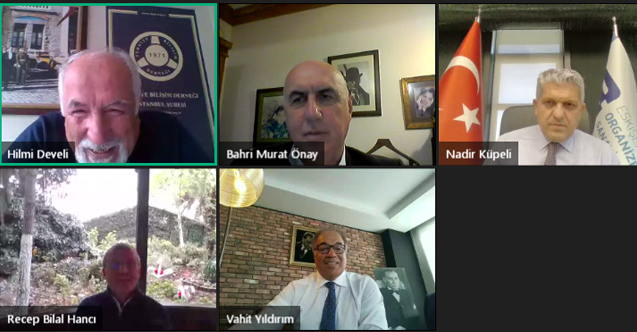
The European Green Deal and Exporting SMEs
In the 'European Green Consensus and Exporter SMEs Panel' moderated by Hilmi Develi, former President of KOSGEB, KobiEfor Writer and Dünya Newspaper Writer,the preparations and activities of Organized Industrial Zones (OIZs) for sustainability and green consensus were explained. Hilmi Develi underlined that Ministries have written various action plans regarding the Constitutional Court, but the important thing is to implement them, to concretize their contribution and especially to take into account the OIZs, and said that he finds the Constitutional Court contradictory with the new draft regulation that eliminates the autonomy of OIZs. Emphasizing that he finds the action plans implemented by the Ministry of Trade and the relevant Ministries regarding the Constitutional Court very good and that he is not pessimistic about the implementation, Develi shared that he thinks the first applications should be in OIZs.
Bahri Murat Önay, Chairman of the Board of Directors of Istanbul Dudullu OIZ, emphasized the importance of the Constitutional Court and said that it will have great sanctions and benefits. Stating that they believe that we can do everything required by the Constitutional Court, Önay said that renewable energy will be preferred, all oil-exporting countries and the flight from oil will begin, but it is expensive to produce green energy, nuclear energy has a great competitive advantage, and HEPPs are very compatible with green energy. Önay said that Turkey should take compliance with the Constitutional Court seriously and plan the next 30 years in a very serious way and added, "Turkey needs to return to green energy as a whole." Underlining that industrialists do not throw away their waste and that they have been working on zero waste for years, Önay said that all the world's white goods manufacturers gathered in Turkey. Emphasizing that rent-seeking activities make all good works lose their value, Önay said, "Green energy will either elevate Turkey's economy or put dynamite under it. As a country, we need to be very tightly connected to green energy."
Recep Bilal Hancı, Chairman of the Board of Directors of Istanbul Tuzla OIZ (ITOSB), said that they were the first OIZ in Turkey to receive the Zero Waste Certificate, and that by raising awareness among the industrialists in the region and following the process with the cooperation of the public sector and the OIZ, they ensured that ITOSB companies also received zero waste certificates. Hancı shared that they have been collecting gray water at the source for 10 years, treating it at the Central Wastewater Treatment Plants and returning it to the environment, using as much as they need for irrigation and discharging the rest to İSKİ, and that they carry out physical, chemical and biological treatment at the wastewater treatment plants and will increase the capacity of the treatment plants this year. Stating that they received the ISO 14001:2004 Environmental Management System Certificate and the Most Environmentally Friendly OIZ award, replaced all lighting in the Zone with LED lighting, and achieved energy savings with the SCADA System, Hancı said, "We generate 7.5 MW of energy (half of ITOSB's 15 MW electricity need) with our Biomass Power Plant. We have many environmentally friendly and sustainable investments in our OIZ. We will continue to produce without harming the environment and health." Pointing out that it is possible for Turkey to become a supply logistics export base with the impact of the pandemic, Hancı said that export records confirm this. Hancı, who thinks that the export potential of countries that are weak in occupational health and safety rules will decrease, mentioned that environmental investments will increase exports, even though it may seem like too much investment in the first place: "I think that our industrialists, who quickly adapt to every condition, will also quickly adapt to EU standards.
Vahit Yıldırım, Chairman of the Board of Directors of Gebze Organized Industrial Zone (GOSB), emphasized the importance of discussing the projection of the next 5 years, rather than what is on the agenda, and said that there are things that individuals and the state should do regarding the Constitutional Court and that there are things that need to be changed in the legislation. Stating that the legislation should be changed urgently and should not be tampered with after it has been changed, Yıldırım said, "Especially OIZs should be involved in this business." Pointing out that OIZs can be role models, Yıldırım reminded that the cost of complying with the Constitutional Court is very high, but the cost of not complying will be much higher. Noting that everyone should take on tasks according to their abilities and responsibilities, Yıldırım said, "Let's declare mobilization. Let's set an example to the world on this issue": "This issue in particular excites me. I say that we are ready to be a role model and to take on all kinds of material and moral duties." Yıldırım argued that education should also be provided in schools from today onwards, and said that we need to instill in people's minds the understanding that 'it's either going to happen or it will happen'. Yıldırım said that certain issues should be changed in the legislation instead of introducing issues that will shake the OIZs and disrupt the structure, and that the regulation to be made without discussing with the large OIZs that have experiences will bring very serious problems, and said, "Legislation should not be changed as a fait accompli."
Eskişehir Organized Industrial Zone (EOSB) Chairman of the Board of Directors Nadir Küpeli said that if an active climate policy is determined for compliance with the ECC in Turkey, our national income will increase by 7 percent, there will be a serious transformation in the industry, there will be a transition to advanced technologies and employment will increase. Mentioning that all companies will clearly measure their carbon footprint in this new period, Küpeli reminded that carbon emission costs will now be added to the cost items of companies due to the 'Borderline Carbon Regulation' to be implemented in 2023. Drawing attention to the importance of the ECC, Küpeli said that it is vital that we adapt to it through the European Green Deal in terms of the future of our economic relations with the European Union (EU), which we export the most with a share of 42 percent in our total exports in 2020: "If the necessary arrangements, improvements and harmonization work are not carried out in a timely manner, it is clear that we are in danger of losing a very serious market in exports. In this context, it is useful to look at where we are as Turkey."
Turkey's 2nd largest. Küpeli explained that as the 2nd largest OIZ in Turkey, they carried out a very comprehensive Industrial Symbiosis Project together with their foreign partners within the scope of an EU project in the previous years, and with the project, the waste of one industrial organization started to be used as the main raw material of another industrial organization, and then they continued their work by developing the project again with the contribution of the development agency on a local basis, He stated that Eskişehir OIZ, which is one of the 2 OIZs selected for the second phase of the 'Green OIZs Project' carried out in cooperation with the Ministry of Industry and Technology and the World Bank, has set an example for the OIZs in our country in terms of green industry and green transformation.
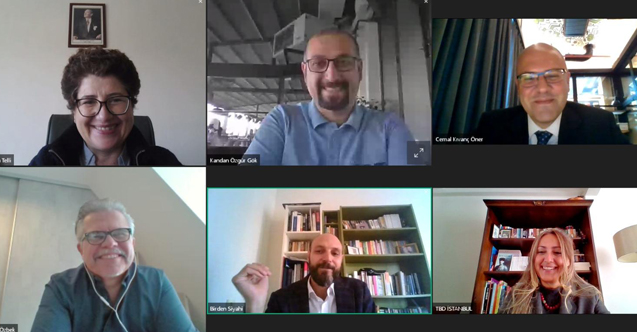
DAY 2 Blue and White Robots
Moderating the 'Blue and White Robots Panel' on the second day of the congress, Prof. Dr. Gonca Telli, Dean of the Faculty of Economics and Administrative Sciences at Doğuş University and member of the Board of Directors of TBD Istanbul Branch, said that robots can easily do what humans can do with difficulty, for example; with simulation systems for disasters such as earthquake prevention, fire progression and floods, possible scenarios can be revealed much more clearly and thus measures can be taken.
Universal Robots Turkey & MEA Country Manager Kandan Özgür Gök said that cobot technology is the easiest way for SMEs to realize digital transformation. Stating that Universal Robots strives to make automation accessible to everyone, Gök explained the advantages of using collaborative robots for SMEs that want to change their production methods in line with digital transformation: "It is becoming more and more widely accepted that collaborative automation is no longer an option but a necessity for SMEs to survive and compete. Today, cobot technology is the most cost-effective, flexible, easily programmable technology with the fastest return on investment."
Noting that they introduced SMEs to cobot technology with the campaign they launched with the motto 'Start today for transformation', Gök said that cobots can be adapted to productions with a wide range of products in high or low production quantities, and that they create added value in production by providing up to 500 percent efficiency increase in production and rapid return on investment. Noting that they anticipate that 45 percent of the total robot market will be occupied by collaborative robots, Gök said that they can teach programming the robot at an easy programming level with an interactive training in 90 minutes on their website, thus facilitating the work of SMEs that have difficulty in transitioning to technology.
Cemal Kıvanç Öner, Chairman of the Board of Directors of Öner Bilişim, said that robots, which have been in our lives for 100 years, have become an integral part of our lives. Describing the robots that do our jobs as 'blue robots' (cobots carrying loads, UAVs, etc.) and the software side as 'white robots' (chatbots serving numerically, ERP, MES, BPM, BI, CRM software, RPA, beverage vending machines, etc.), Öner explained that as Öner Bilişim, they provide cooperation and consultancy services with ERP, BI (business intelligence), HR-HCM (HR software) RPA. Foreseeing that in the future, the discourse of 'I am not a robot' will change into 'I am a robot' and 'I want to meet with a robot', Öner said, "It seems that we will be organic creatures cared for by robots."
Oğuz Özbek, Co-Founder of BiLiG OpEx, stated that digital transformation has entered our lives with Industry 4.0 and said that 50-70 percent of the projects in this field are unsuccessful and 64 percent are cost-ineffective. Stating that they have turned to process and data mining as a company over time, Özbek said that in order for digitalization to be effective in successful automation investments, cost-effective applications must be put into use. Referring to the need for process modeling for this, Özbek said that process mining applications enable them to master the flow of the process with 100 percent accuracy, so that they can make predictions for the future with simulations. Explaining that while process mining keeps all data related to process management and analysis, task mining is required for user-level data, Özbek noted that when task and process mining are integrated, the entire process can be seen end-to-end.
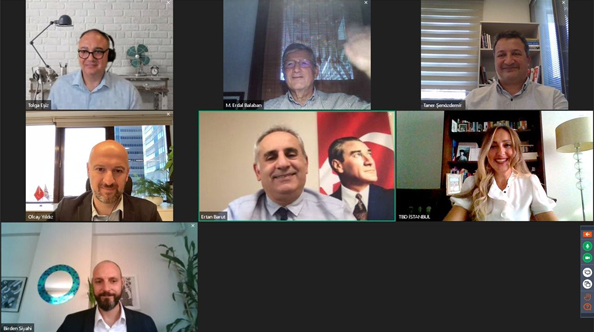
Discover Potential, Next Generation Software
Prof. Dr. Erdal Balaban, Chairman of the Honorary Board of TBD Istanbul Branch, who moderated the Discover the Potential, New Generation Software Panel, recalled the slogan 'development through software' used by TBD in previous years and emphasized that 'how software and technologies can add value to the economy and how we can increase their share in exports' is very important.
TOBB Turkey Software Assembly President Ertan Barut said that the IT sector, especially software, is indispensable in many sectors and exports. Stating that Turkey's software exports are around 800 billion dollars, 1.5 billion dollars with game software and 3 billion dollars in total with others, and that they have started to work as the TOBB Software Assembly to increase this figure, Barut announced that software-specific support and incentives will be published soon, and that they are working with the Ministry of Industry and Technology on domestic software. Barut, who thinks that the Green Consensus will be very effective, pointed to the importance of national and domestic software, and stated that the transformation in the software index on the SMEs side will contribute a lot to exports in the production for the Constitutional Court.
Stating that their aim is for SMEs to adapt to technologies, Barut emphasized that both NGOs and the state have important duties in raising awareness: "In order to be a pioneer, the software sector has great duties. There is a need for serious incentives and support from the state while companies are making their production. We also recommend that our SMEs trust the software industry." Addressing SMEs, Barut stated that there are many domestic software in areas such as ERP and MES, and suggested that they make a bold decision towards digital transformation and domestic software. Barut shared that they foresee that an export figure of 10 billion dollars can be reached with support mechanisms at the end of 3 years.
TÜRKKEP General Manager Olcay Yıldız stated the importance of compliance with the Constitutional Court and listed the most important things that companies should do as 'reducing carbon emissions, using green energy and obtaining carbon certificates'. Warning that carbon certificate prices will increase significantly in 2025, Yıldız emphasized the importance of the question 'How can we produce by consuming less energy in production and using green energy? Explaining that they put their products on the Smart SME Platform, Yıldız said, "We really need to motivate SMEs to the digital side." Sharing that they have 170 dealers and about 2,000 customers, mainly in industrial zones, Yıldız said that SMEs can speak in a language that companies understand, and that informaticians can contact them.
PAPERWORK Company Partner Tolga Eşiz explained that they manage all documents and processes of the companies they serve, increase efficiency, eliminate paper from companies, make processes traceable, and thus prevent huge amounts of carbon emissions.
Eşiz said that the good point of the pandemic requires companies to invest in the infrastructure necessary for remote working and prevents significant carbon emissions and that MES can be a starting point for SMEs, "Whether you digitalize or not. The world does not stand still in digitalization, whether you catch up or not. This is a vital issue. If you don't do this, someone will crush you. If you do not digitalize, you cannot own data. The name of the game has changed; the new name: speed. From software to MES, without these, companies will be out of the game." Reminding Atatürk's quote "Every factory is a fortress", Eşiz underlined that the Constitutional Court should be seen as an opportunity, not a threat.
TREXDCAS General Coordinator Taner Şenözdemir stated that they have been offering MES (Production Management / Execution System) solutions to more than 300 companies in 78 countries including Turkey for about 15 years and said that their main job is to increase productivity in factories. Stating that the pandemic has turned into an opportunity for them, Şenözdemir noted that it will be revealed that factories that want to increase their productivity in this process need MES solutions. Şenözdemir summarized the situation of SMEs with the words 'trying to stand on a one-legged chair' and suggested that they follow innovations, be proactive and develop their employees. Şenözdemir emphasized that the most important thing is to raise awareness among SMEs: "The sector must solve the awareness story."
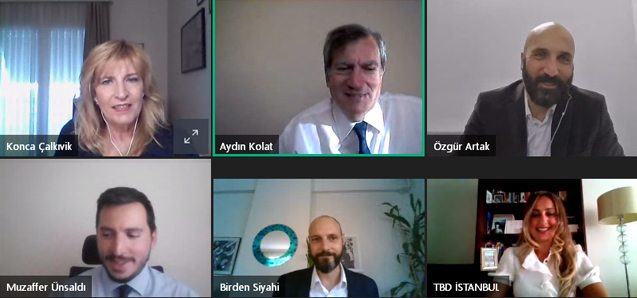
Sectoral Impacts of the European Green Deal
Moderating the 'Sectoral Impacts of the European Green Deal Panel', Dr. Aydın Kolat, Chairman of the Executive Board of TBD, said that the consequences of human-induced climate change are seen as a decrease in biodiversity and social inequality, and that these are serious problems and that all processes in production must be improved.
Konca Çalkıvik, Secretary General of BCSD Turkey, said that 10 years are critical to mitigate the devastating effects of the climate crisis and that very serious measures must be taken to keep global warming to 1.5 degrees Celsius: "In order to live in prosperity, we need to use resources well and act around a common vision. Green transformation in SMEs means resource efficiency and increasing competitiveness at the same time." Çalkıvik stated that they have established an e-commerce system in cooperation with the EBRD since 2016, where companies' wastes are utilized, and transformed it into the Circular Economy Platform, that membership to the platform, which has nearly 200 member companies, is free of charge, and that 1 million 750 thousand Euros worth of materials have been recovered through material exchange so far, and invited the entire business world to join this platform. Çalkıvik shared that as BCSD Turkey, they have reached nearly 50 signatories in the plastic waste initiative in cooperation with TÜSİAD and Global Compact, 34 companies have made commitments to use less plastic, and that they are working with the Ministry's Green Consensus Action Plan Working Group: "Using resources efficiently and taking advantage of opportunities is very important in the next 10 years."
Özgür Artak, Chairman of the Board of Directors of the Value Audit Association, said that there is no standardization on the green issue yet, and that companies determine their own paths. Artak noted that we are talking about a structure where Big Data is integrated into our lives, and that the Constitutional Court is important in shaping common prosperity and common vision: "I think the green economy will be very beneficial for our country."
Muzaffer Ünsaldı, Corporate Communications Manager of SAHA Istanbul, stated that SAHA Istanbul has reached 661 members, 83 percent of which are SMEs, and that there are 21 universities in their cluster: "We are growing with our fast and domestic production power, and we produce the defense industry products of the industry. SAHA Istanbul is also known as a new generation industry cluster. We are organizing a hybrid fair on November 13 this year. SMEs will come together with foreign delegations. After November 15, the virtual fair will continue for three months." Ünsaldı said that the most difficult thing for SMEs may be to switch to modern practices for optimization in production, and that they also provide simulation studies and mentors to the participants. "We need to save our own ecosystem beyond the industry," Ünsaldı said.
Murat İnkun, Secretary General of PAGDER, stated that PAGDER has approximately 500 industrialist members and said that the part of the Constitutional Court that concerns the plastics sector is the circular economy action plan. Pointing out the importance of the recycling side, İnkun said that the issue of plastic waste is frequently discussed and brought to the agenda, that there is a planning for single-use products, that there is a complete ban on certain products, and that studies are being carried out to use recycled raw materials in plastic packaging. Inkun emphasized the importance of all NGOs coming together on the Constitutional Court.
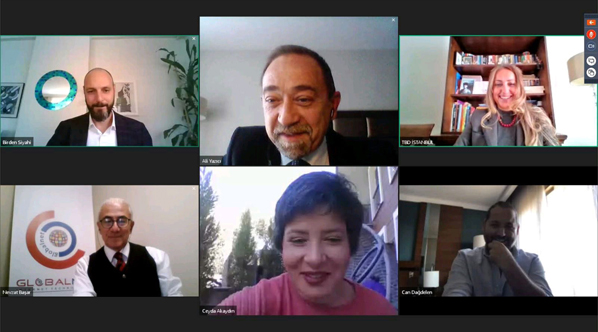
Are We Above the Clouds, Are We Aware?
Moderating the 'Are We Above the Clouds, Are We Aware?' Panel, Ali Yazıcı, President of TBD II, pointed out that scalability, efficiency and performance have come to the forefront with IT infrastructures, and security with the cloud.
Referring to many applications used in the cloud, Can Dağdelen, CEO of Parametre, said that Netflix is seen as an online TV series viewing platform today, but according to its plan in the near future, it will promise a cloud-based gaming system. Stating that even though Instagram is getting stronger, Facebook is not dead yet and is still one click ahead of Instagram, Dağdelen said that we use cloud-based systems in travel and traffic. Noting that they produce spatial-based data as parameters and make spatial-based process planning, Dağdelen said that they are talking about a system, cloud architecture, where you can design the arrangements made entirely on the cloud system. Dağdelen suggested that especially SMEs should adapt to cloud technologies faster by taking the legal side into consideration.
Giving information about the history of data, Nevzat Başar, Deputy General Manager of GLOBALNET, said that with the widespread use of the internet in Turkey, it is now possible to access all kinds of data at any time and from anywhere, that data has now turned into a value, and that data movement can only be solved with the cloud. Stating that SMEs using the cloud can save employees and provide serious cost advantages since they will create their software and hardware needs in cloud computing, Başar said that cloud computing, which provides great advantages to companies, especially SMEs, offers flexibility, faster access to data since it uses internet infrastructure, efficiency and performance increase.
Lawyer and TBD Istanbul Branch Chairman Ceyda Akaydın gave information on intellectual property and copyrights in the field of software, and said that if you have not taken over the financial rights of the software, if you are not the author, you only have the right to use one copy of it, and that you cannot have financial rights in software. Referring to the fact that there may be problems in terms of distributed clouds, Akaydın said that data can be legally transferred to safe countries in the legislation, but when a distributed cloud is used, it is not known where and in which country the data is, and this is a risk. The second risk is that it is possible to apply to the KVKK and obtain permission for data transfer, but this cannot be done in the distributed cloud. Akaydın underlined that although it is not 100 percent prohibited to take data abroad, it depends on permission: "The law says 'protect the data'. It is not possible to provide that security in small or non-large companies, the cloud is more secure. It is also useful to think in terms of continuity."

 "My spiritual heritage is knowledge and reason. Those who come after me will confirm that in the face of the difficult and deep-rooted difficulties we had to overcome, we may not have achieved our goals completely, but we never compromised, and that we were guided by reason and science." Mustafa Kemal Atatürk
"My spiritual heritage is knowledge and reason. Those who come after me will confirm that in the face of the difficult and deep-rooted difficulties we had to overcome, we may not have achieved our goals completely, but we never compromised, and that we were guided by reason and science." Mustafa Kemal Atatürk

